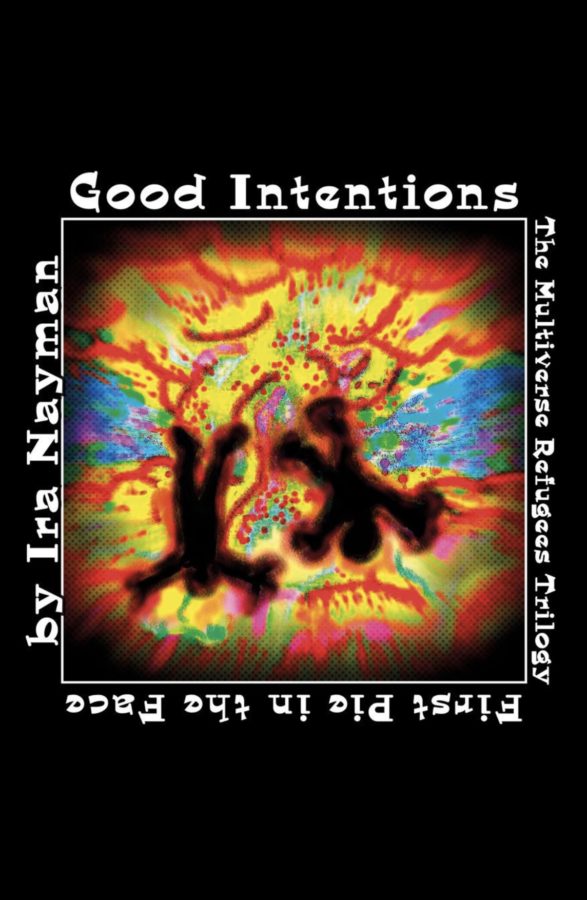Genre: Sci-Fi, Humor, Political Satire
Reviewer: Valerie
Get It On Amazon
About The Book
At the end of You Can’t Kill the Multiverse (But You Can Mess With its Head), Doctor Alhambra, the chief scientist of the Transdimensional Authority, set up an alarm to warn him if a universe is succumbing to the universe-killing machine that is at the heart of the story. But how would the Transdimensional Authority respond if that alarm went off?
In Good Intentions, the first book in the Multiverse Refugees Trilogy, but also the sixth Transdimensional Authority novel, we find out. In the process we not only meet the most unusual refugees in fiction (probably), learn what Noomi Rapier’s brother does (and with whom), revisit Dingle Dell, and finally discover what happened to chapter seventeen of The Multiverse is a Nice Place to Visit But I Wouldn’t Want to Live There.
The Review
Good Intentions is the winding, wandering tale of an alien refugee who is determined to bring slapstick comedy to the multiverse one pie at a time. The humor lies in the parenthetical commentary, footnotes, and appendices, which makes the read a bit labor-intensive. Once I figured out how to read it without drowning in word soup, I enjoyed in the light-hearted story of Rodney the alien. The story is filled with pop sci-fi references and packed with traditional sci-fi tropes. Overall, I found the story entertaining.
The opening chapter is a mound of parenthetical commentary. The second chapter is straight dialog with no tags at all. The narration calms down in chapter three, though the author is constantly breaking the fourth wall. Eventually, we glean to the heart of the story—there’s a universe about to implode and the people of Earth Prime (plus some digits I don’t recall) have decided to save and rehome seventeen billion aliens from the Earth in that reality. The “masterful” plan starts with collecting one alien—Rodney.
Rodney’s alternate Earth is a strange place that I liken to Toon Town, because pianos, anvils, and the like are constantly falling from the sky. Rodney and his kind live to impress their Audi Enz mostly with slapstick humor like pies to the face. Taken out of his element to Earth Prime, we see Rodney interact with government officials, a prison warden, the operative who saved him, and a family who thought they were adopting a pet. Through all of this, the humans seem completely unprepared for a cultural exchange, expecting Rodney to “behave” even though he has no idea what the word means. Rodney, meanwhile, seems content to be along for the ride, learning new things and sticking staunchly to his comedy.
Earth Prime, the story’s primary setting, has a retro vibe, and is filled with off-brand replicas of pop culture icons, both modern and nostalgic. The plot moves at the speed of government, which I think is kind of the point, as the Canadian government (it’s set in Canada) seems completely unprepared to handle their refugee despite having taken the initiative to retrieve him. There were long detours of commentary, so readers really need to be in it for the journey, not the destination.
Some of the humor fell short for me. The aliens being constantly described as wearing “exquisite three-piece suits” and the frequent recurrence of the pie-in-the-face started to feel one-note. Fart and sex humor seemed to be the only alternatives. Also, while I appreciate the sci-fi references to pon farr and sperm whales, I wished for more originality. The author constantly breaking the fourth wall to explain to the reader that this or that was hilarious undercut the humor itself. I have mixed feelings about the appendices and footnotes because in order to enjoy them, you had to break the flow of the narrative. Given the formatting requirements, it’s probably better as a paperback.
While not riveting or ground breaking, this book is a mood, and if you’re ready for the winding narration and in it for the ride, it’s an entertaining tale.
The Reviewer
I’m an aromantic, asexual, agender person who is currently using she/her pronouns. I feel like diverse identities should exist in literature without being a central aspect of the plot.


